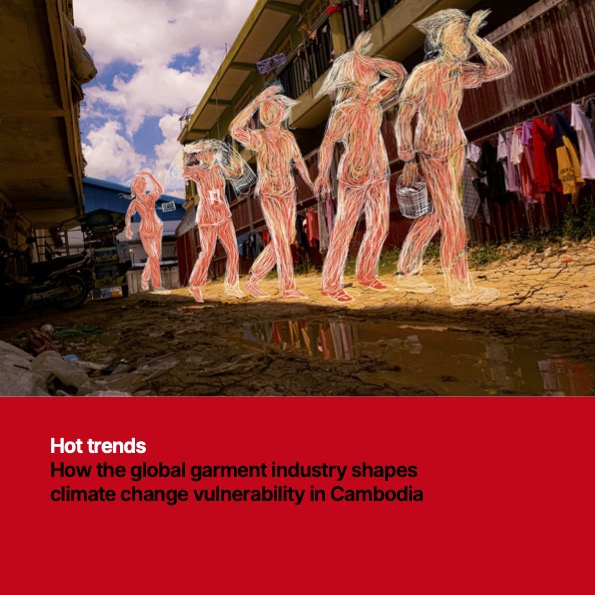In response to mounting public pressure, companies have moved rapidly to launch media campaigns highlighting their commitment to a green future. The global garment industry is no different. Behind much of this “greenwashing” remains the reality that the garment supply...
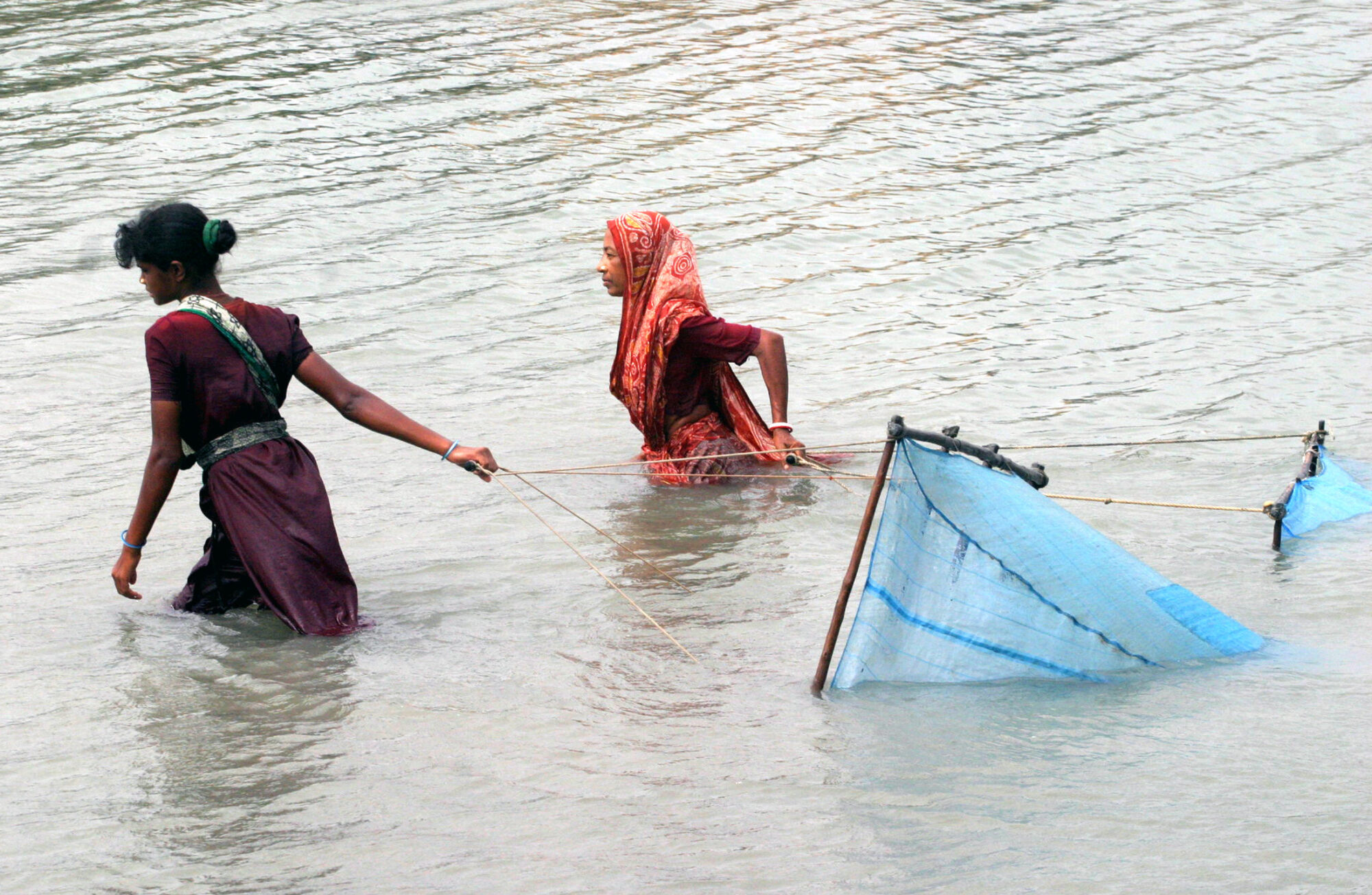
The livelihoods and safety of these women fishing shrimp from a river southwest of Dhaka are increasingly threatened by climate change. Given that 80 percent of Bangladesh’s land is low-lying floodplain, seas are rising and area cyclones are escalating in frequency and severity, one in every seven of the country’s people will be displaced by climate change by 2050. Credit: Reuters/Rafiqur Rahman– stock.adobe.com
The climate crisis impacts workers and their communities in a multitude of ways. Flooding, drought and extreme weather events push workers to migrate, often into low-wage jobs under dangerous conditions. Workers in highly polluting industries face the dual impacts of occupational health and safety hazards and environmental degradation, both of which put their families and communities at risk. Marginalized workers—including minority populations, workers with disabilities, women, youth, migrants and workers in the informal economy—are already experiencing some of the worst impacts of climate change and are often excluded from decision-making processes.
Workers and their unions are uniquely positioned to help build a global climate justice movement, bolstered by their support from, and participation in, broad-based coalitions as well as long-term experience in people-centered policy and legislative advocacy in their respective countries.
As governments and industries plan to transition to cleaner alternatives, workers and their unions must have a meaningful say in the process to ensure that a greener economy is also one that protects worker rights and advances decent work. The needs of workers and their communities must be at the center of climate-responsive policies and practices, including in designing a fair or just transition to a more equitable and sustainable economy as a way to mitigate the impacts of climate change and enable adaptation for impacted communities.
Our Approach
The Solidarity Center recognizes that addressing the climate crisis is critical to ensuring decent work and a strong labor movement in the future. In response, the Solidarity Center supports workers and their unions to:
- Develop worker-driven climate solutions and play a significant role in their implementation to protect hard-fought gains and advance worker rights in changing industries
- Use collective bargaining to advance cleaner, safer and more sustainable operations across sectors; and ensure an inclusive process that prioritizes the needs of workers and their communities in transitioning sectors.
- Build broader coalitions, securing the mutual commitment of climate, human rights and community organizations in the fight to win decent, unionized green jobs; build healthy, resilient and sustainable communities; and support worker rights
- Effectively participate in national, regional and global climate justice negotiations and hold policymakers and employers accountable for achieving a just transition to a cleaner economy that enables workers to enjoy their fundamental freedoms and rights; and
- Advance an enabling legal environment to achieve a just transition, recognizing the critical link between labor rights and environmental justice.
Our Programs
Solidarity Center initiatives to advance climate justice include:
- Legal research on the new forms of collective representation and collective bargaining necessary to attain a just transition, and, with the Solidarity Center’s International Lawyers Assisting Workers (ILAW network), litigation of cases and legal processes and advocacy that advance worker rights
- Following a convening of palm oil unions from Colombia, Honduras, Indonesia and Malaysia, with environmental partners, implementation of a strategic plan by labor leaders from those countries that addresses issues with common actors and challenges within the supply chain, and pursues advocacy avenues for worker protection demands and engagement in policymaking on climate-change mitigation measures
- A coalition-building program in Colombia, Indonesia, Nepal, South Africa and Ukraine that raises awareness within and between unions, environmental and community groups about the environmental impact of the extractive and energy sectors in their respective countries while identifying opportunities for coalitions to advocate for safe, sustainable employment within these sectors
- Publication and dissemination of a report on the intersection of climate change and migration in Bangladesh that highlights for policy makers in that country how climate-related salinization has diminished the ability to grow rice and demonstrates that many workers are forced to migrate in search of jobs elsewhere or seek lower paying jobs in the shrimp industry
UNION WOMEN FIGHT FOR CLIMATE AND GENDER JUSTICE
Brazil and Honduras Solidarity Center partners raised union women’s voices in three civil society sessions of the UN Commission on the Status of Women last week, focusing on issues including femicide in the world of work, climate change as a root cause of migration...
Labor Leaders, Activists: Women Workers Critical in Driving Inclusive Climate Solutions
Climate change and environmental degradation have exacerbated gender inequality and worsened existing inequities resulting from resource scarcity, conflict and climate-related shocks. Women workers—particularly those in the informal economy—bear significant burdens...
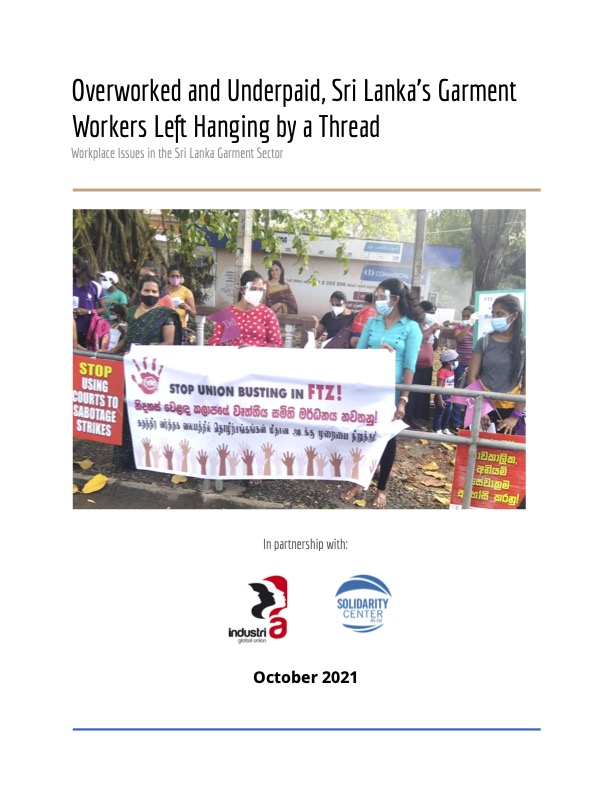
Overworked and Underpaid, Sri Lanka’s Garment Workers Left Hanging by a Thread
A survey of garment workers in Sri Lanka, conducted in partnership with Solidarity Center and IndustriALL, found employer opposition and harassment has limited their ability to form unions and address workplace rights violations such as increased workloads and work...
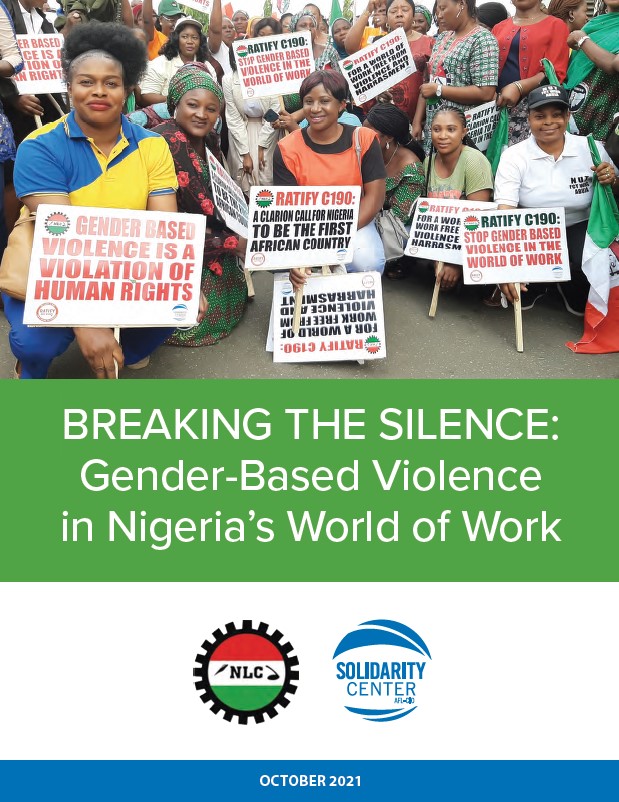
Breaking the Silence: Gender-Based Violence in Nigeria’s World of Work
An alarming 57.5 percent of women workers interviewed across all sectors for this Nigeria Labor Congress (NLC) report say they experienced gender-based violence and harassment (GBVH) in the world of work. More than one-third of respondents said that even when...
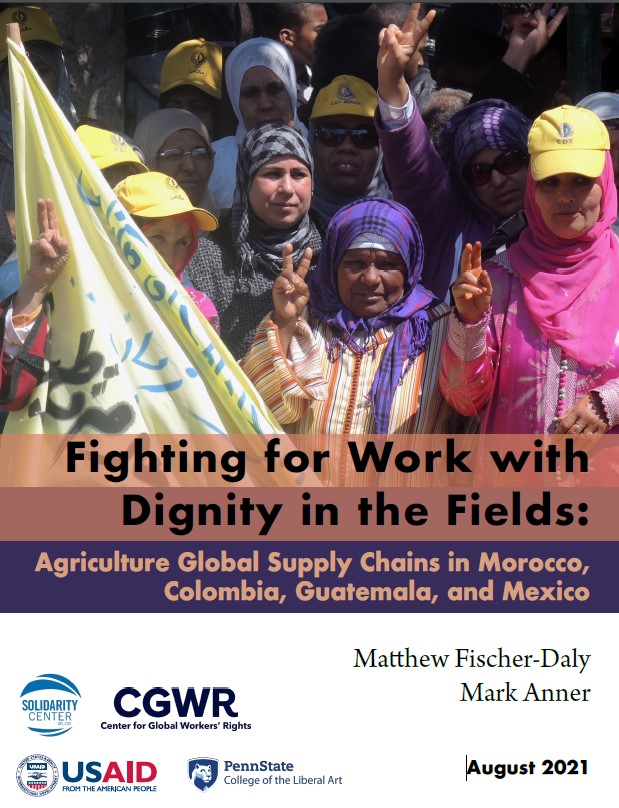
Fighting for Work with Dignity in the Fields: Agriculture Global Supply Chains in Morocco, Colombia, Guatemala and Mexico
Where unions establish collective bargaining, they initiate the strongest mechanism for protecting agricultural workers’ rights, health and dignity. Through analysis of five agribusiness sectors—including palm oil in Colombia, bananas in Guatemala, strawberries in...
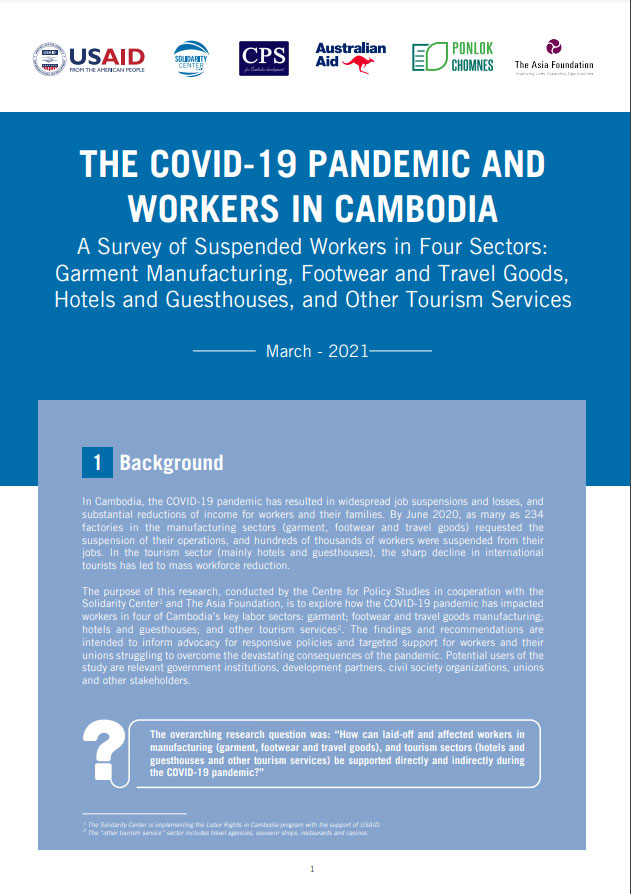
THE COVID-19 PANDEMIC AND WORKERS IN CAMBODIA
As a new wave of COVID-19 hits Cambodia, a new study recommends urgent action to ensure garment and tourism workers workers do not experience widespread loss of jobs and wages as they did in 2020. The Center for Policy Studies survey is supported by Solidarity Center...
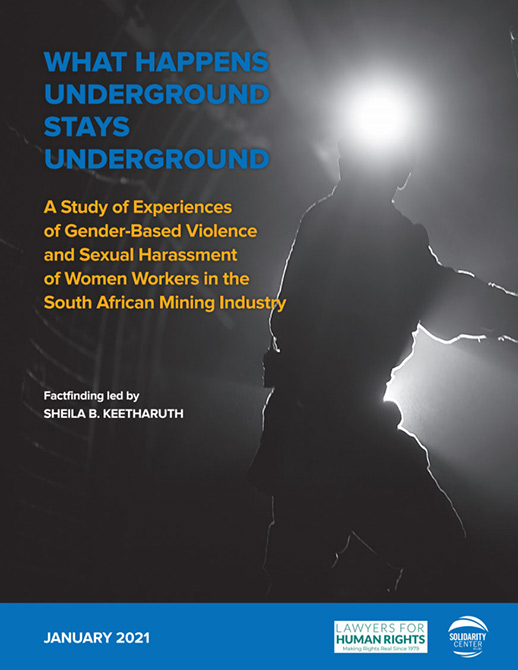
What Happens Underground Stays Underground
Women working in South Africa's mining sector report being subject to sexual and gender-based violence and harassment, inside mines and within the mining communities where they live and efforts to redress such abuse must address the nature of the workplace and...
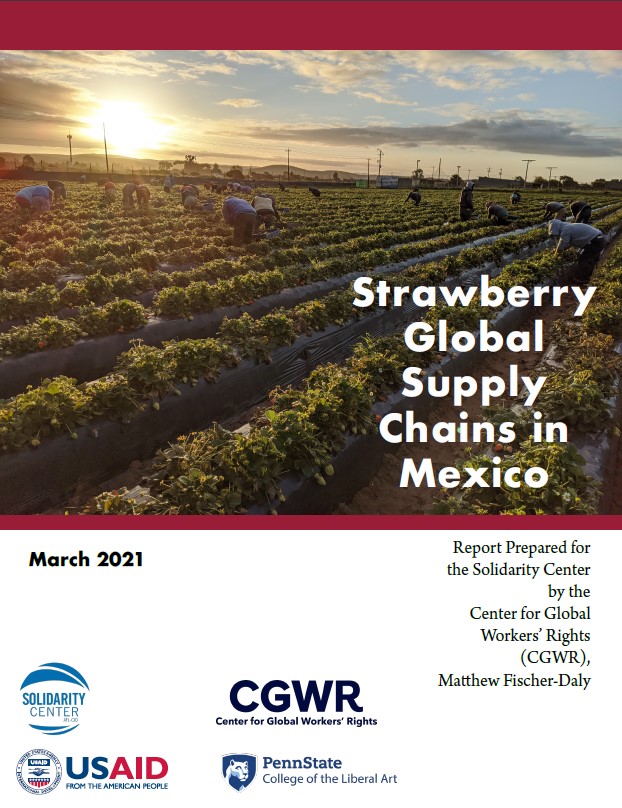
Strawberry Global Supply Chains in Mexico
The governments of Mexico and the United States have supported the growth of the Mexican berry sector by creating conditions for a cheap supply of labor and profit growth. Mexican field workers receive an estimated 12 cents per pound of strawberries sold in U.S....

